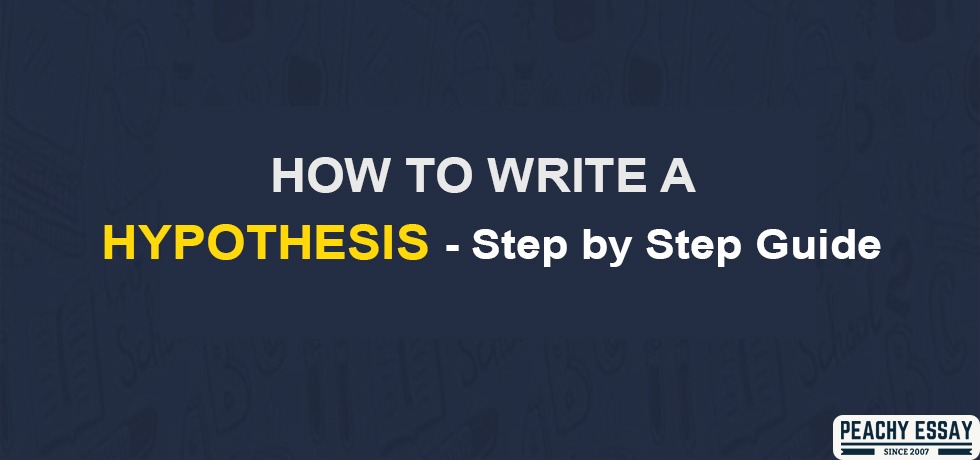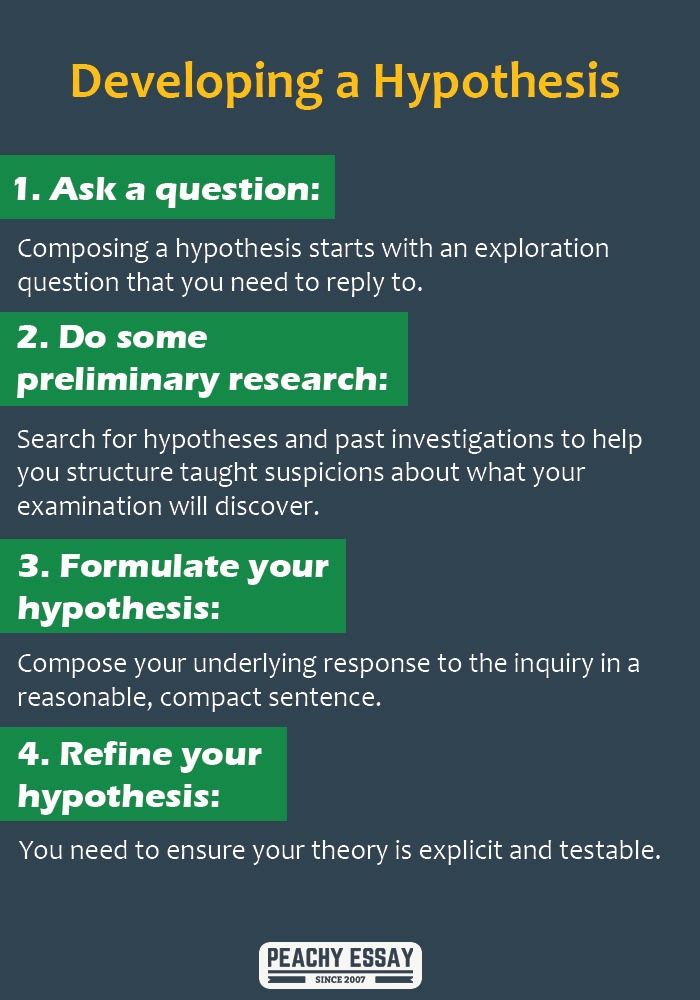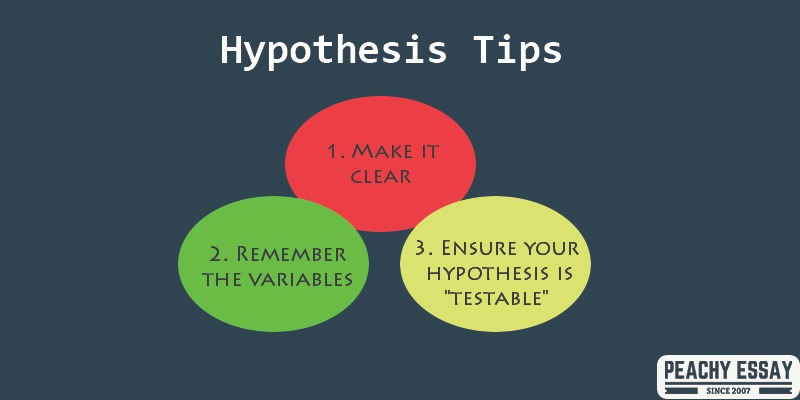Knowing how to write a hypothesis is a crucial aspect of your research or academic writing process. However, formulating the right hypotheses for your research can be challenging if you don’t know how to go about it. In case you are in such a situation, don’t worry; you will get solutions in this article.
What is the hypothesis?
A hypothesis is an assertion of your study intent. It tells the reader what you wanted to do in your research. Yet, there’s somewhat more to it than this. The hypothesis turns into a piece of the logical technique if is testable, and informed from past published work regarding the matter.
Indeed, your hypothesis has to be informed by the literature, which is the reason you invested so much energy and exertion creating an introduction to inform your audience. This is why your hypothesis normally comes toward the finish of your introduction since you burn through the entirety of the opening educating your reader concerning it. There’s a very little point recorded as a hard copy more after the hypothesis, on the grounds that once your reader has understood that they are prepared to find out about how you approached testing it.
The other significant highlight make is that the writing should direct how you compose your theory and the factors that you incorporate. If you realize that temperature is the main variable however the entirety of the writing recommends that it is oxygen, you can’t disregard oxygen and you ought to likewise outline your hypothesis utilizing this variable. For this situation, you will likewise have to give an adequate prologue to temperature as a variable to legitimize its inclusion in your theory. Unreasonably, your point isn’t to demonstrate that your thought is correct, but to show that the hypothesis isn’t right.
We as a rule attempt to compose a hypothesis that is falsifiable: for example, you can demonstrate that it isn’t right. That is the reason it is customary to give the ‘Null hypothesis that is the falsified version of the assertion, recommending that there is no connection between the variables you have proposed to gauge. The convention is to name this H0, while the ‘alternative hypothesis’ is composed as H1. You can keep in touch with your alternative hypothesis to show the directionality of your tried variables, or essentially that there is a relationship.
Above all, your hypothesis must start things out, before you do the investigation or study! Setting the hypothesis after the work is now done is deceitful, and conflicts with the logical technique. Clearly, it isn’t reasonable to represent the hypothesis once you definitely know the appropriate response. This is the reason there is so much emphasis put on defining your hypothesis during your research proposal. Hitting the nail on the head will figure out what you do and how you test it. In the event that you think about an additional hypothesis that would be truly helpful to test once you’ve just done your investigation, you can lead a post hoc test, yet this ought to have more tough degrees of the measurable appraisal.
Composing a hypothesis isn’t simple, but it is fundamental and whenever you’ve perceived what to do, the majority of the remainder of what you are composing for should bode well.
What a hypothesis isn’t
It’s not a question thus ought to never have a question mark after it.
It isn’t generally a basic expectation: If it is the case, you will see commonly on the web that hypotheses are clarified in this basic prescient system. I state that it isn’t ‘generally’ a basic forecast on the grounds that these are bad speculations. They come up short on the unthinking and insightful part of decent speculation, which is the thing that we need to accomplish.
The most effective method to assess your hypothesis
Whenever you’ve composed your hypothesis, how would you choose whether it is or not acceptable? To do this, you may believe that you need a lot of involvement. However, you simply need to search for the components that are examined previously. So whenever you’ve composed your hypothesis, attempt to respond to the inquiries underneath:
Is there a clear prediction (if… then… statement)?
Does the prediction utilize independent and dependent variables accurately?
Is the mechanism supported by the literature?
Is the theory testable/falsifiable?
Does the theory utilize succinct phrasing and exact wording?
Developing a hypothesis
Here are the steps towards developing a hypothesis
-
Ask a question
Composing a hypothesis starts with an exploration question that you need to reply to. The inquiry should be engaged, explicit, and researchable inside the imperatives of your task.
Do students who attend more lectures get better exam results?
-
Do some preliminary research
Your underlying response to the inquiry should be founded on what is now thought about the subject. Search for hypotheses and past investigations to help you structure taught suspicions about what your examination will discover.
At this stage, you may build a theoretical system to distinguish which factors you will consider and what you think the connections are between them.
-
Formulate your hypothesis
Presently you ought to have some thought of what you hope to discover. Compose your underlying response to the inquiry in a reasonable, compact sentence.
Example:
Attending more lectures leads to better exam results.
-
Refine your hypothesis
You need to ensure your theory is explicit and testable. There are different methods of expressing a theory, but all the terms you use ought to have clear definitions, and the speculation ought to contain:
The relevant variables
The specific group being studied
The predicted outcome of the experiment or analysis
-
Rewrite your hypothesis in three ways
To identify the variables, you can compose a straightforward hypothesis if the initial segment of the sentence expresses the independent variable and the subsequent part expresses the dependent variable.
In the event that a first-year understudy begins going to more talks, at that point, their test scores will improve.
In academic research, hypotheses are all the more usually expressed in terms of correlations or impacts, where you straightforwardly express the anticipated relationship between variables.
The number of lectures attended by first-year students has a positive effect on their exam scores.
If you are contrasting two groups, the hypothesis can state what difference you hope to discover between them.
First-year students who attended most lectures will have better exam scores than those who attended a few lectures.
-
Compose a null hypothesis
If your research includes statistical hypothesis testing, you will likewise need to compose a null hypothesis. The null hypothesis is the default position that there is no relationship between the variables. The invalid theory is composed as H0, while the elective speculation is H1 or Ha.
H0: The number of lectures attended by first-year students has no effect on their final exam scores.
H1: The number of lectures attended by first-year students has a positive effect on their final exam scores.
Hypothesis Tips
Here are the hypotheses writing tips.
The question comes first. Before you make a theory, you need to obviously recognize the inquiry you are keen on contemplating.
A hypothesis is a statement, not an inquiry. Your hypothesis isn’t the logical inquiry in your venture. The hypothesis is an informed, testable expectation about what will occur.
Make it clear: A decent hypothesis is written in clear and straightforward language. Perusing your theory should tell an educator or judge precisely what you thought planned to happen when you began your venture.
Remember the variables: A decent hypothesis characterizes the factors in simple to-quantify terms, similar to who the members are, what changes during the testing, and what the impact of the progressions will be.
Ensure your hypothesis is “testable”: To demonstrate or discredit your hypothesis, you should have the option to do a trial and make estimations or mention objective facts to perceive how two variables are related. You ought to likewise have the option to rehash your analysis again and again, if vital.
Components of a Good Hypothesis
When attempting to think of a decent hypothesis for your own exploration or investigations, ask yourself the accompanying inquiries:
Is your hypothesis dependent on your research on a subject?
Can your hypothesis be tested?
Does your hypothesis incorporate autonomously and ward factors?
Before you think of a particular hypothesis, invest some energy doing background research. Whenever you have finished a writing survey, begin considering potential inquiries you actually have. Focus on the discussion segment in the journal articles you read. Numerous creators will recommend questions that actually should be investigated.
To write a good hypothesis, you should make these strides:
Gather the same number of perceptions about a point or issue as you can.
Assess these perceptions and search for potential reasons for the issue.
Make a list of potential clarifications that you should investigate.
After you have built up some potential hypotheses, consider ways that you could affirm or negate every theory through experimentation. This is known as falsifiability.
Instructions on how to compose a hypothesis
Select a subject that intrigues you and you have found out about it. The data should be utilized to infer potential responses to what you might want to explore on. It can likewise be found in books from the library and on the web. Pick a point that you’d prefer to find out about. Choosing an intriguing theme causes you to produce a hypothesis before the investigation. For instance, pick a subject like, for what reason is the proportion of obese ladies is bigger than that of men? This is a theme that may raise a conversation, and the writing of this data will fluctuate. The data in books composed by various individuals will be extraordinary.
Read existing exploration on the point you have chosen, research, and ask to assemble data on the theme. One should be a specialist in whatever the point they have picked and attract speculation from them in the end. The data to be accumulated should be unprejudiced and exact. Reading will help you draw speculation on the theme before a logical strategy is utilized to invalidate the theory explanation. Reading and teaching yourself on the subject of study before you attract a theory assists with diminishing odds of a null hypothesis after the investigation. Basing on the above subject, one can peruse philosophical books and reports on weight and discover books on the explored results on the related theme. Data could likewise be found in sites and recordings and other computerized gadgets.
Analyze the data you have assembled from all the materials you have utilized. With the data you have gathered, define questions that are unanswered in the articles, recordings, and archives, and this will help you in your examinations. Peruse the data you have gathered from all the materials and ensure they are extensive. When drawing your hypothesis, it should be founded generally on what you think about the subject. For instance, in the data, you will see that ladies are not practicing a lot and this is the thing that causes weight. You will discover a method of composing your hypothesis dependent on for what reason makes ladies not to work out. Imagine a scenario in which they worked out, will it diminish the degree of corpulence among ladies.
Come up with queries after reading about the topic, and its literature. From the work you have examined, you will discover questions you might want to investigate. These are the issues you record, and you might want to do a lot more exploration on the theme. The created questions are those that will control your exploration later on. The inquiries are drawn, structure the writing used to assist you with exploring the subject you have chosen. This will manage your examination in the event that you might want to investigate further. For instance, in light of the above investigation, you would state, “How does practicing help lessen the degree of heftiness in ladies?”
Later concoct signs on what you figure the solutions to your inquiries may be. The inquiries that were charged because of the investigation of data on the point will help you structure a premise of your theory. Indeed, even the missing data that is obscure may get some theory dependent on the information you have of the point. For example, in light of the data, you should attempt to discover answers to questions that may provide some insight on for what reason don’t ladies practice contrasted with men.
Get a straightforward hypothesis point that won’t give you cerebral pain to think of the inquiries and figuring a hypothesis
The most effective method to write a Hypothesis
You understand what a hypothesis is; the thing that reason it serves; how it is to be tried. The whole examination or experience rotates around a hypothesis. So, a slight mistake in writing a hypothesis could result in wastage of time, money, and effort.
While testing a hypothesis is a complex process, composing a hypothesis is the trickiest part. Obviously, you should be amazingly cautious when composing a hypothesis that you will test. It is pondering the correct question – an inquiry that can be tried and results acquired from it can improve your understanding or meet your objectives.
Remember that there is no single attempted and tried strategy for composing a hypothesis. You can see a conventional connection between two factors and afterward can refine it. Here is a model:
“Guys and females diversely handle worker issues”.
In this proclamation, we composed a generic hypothesis. It isn’t quantifiable.
“Females handle employee issues better than males”.
The subsequent assertion gives a course, as in who improves. At the point when you analyze two things, it implies a circumstance is quantifiable.
“If females are assigned the task of handling employee issues, then they will do a better job than males because females have higher emotional quotient”.
The third assertion, as should be obvious, offers explicit subtleties. The distinction in the degree of passion remainder of guys and females puts things in place. It is quantifiable.
Accordingly, a well-composed hypothesis should be:
Measurable
Quantifiable
Testable









